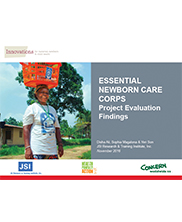Sierra Leone has one of the highest maternal mortality and neonatal mortality rates in the world with 1033 maternal deaths per 100,000 live births, and 30 stillbirths and 49 neonatal deaths per 1000 births. A contributing factor is poor care at delivery, with less than half of deliveries attended by a skilled birth attendant and one in four carried out in health facilities. Within this context, traditional birth attendants (TBAs) are a potential resource to help Sierra Leone achieve its Millennium Development Goals to reduce child mortality and improve maternal health. TBAs provide health services widely; however, a 2010 policy change disallows TBA-led childbirth, creating challenges in working with this key group of actors in the health system. The Essential Newborn Care Corps (ENCC) pilot of the Innovations for Maternal, Newborn and Child Health (MNCH), an initiative led by Concern Worldwide in collaboration with JSI Research & Training Institute, Inc. explores solutions for TBAs’ role in health service delivery.
Piloting the intervention in the resource-poor setting of Bo District, Sierra Leone, the project provides standardized training to TBAs as MNCH health promoters to ensure quality care for pregnant women and newborns and to properly refer complications during home visits while selling health-related products. MNHPs provide a linkage between the community and government health facilities by referring women to the facilities for medical care. Selling products complements the MNHPs’ primary role in referring women to health facilities and the income they earn from sales provides an incentive for them to do so.
JSI served as the global research partner for the initiative. In this report, we present triangulated findings from quantitative surveys, repeated qualitative studies, and program monitoring data. That goal was to elicit the effectiveness of the HP and HP+ interventions (alone and combined) on utilization of MNCH services and to examine whether the intervention followed the pathways of change as outlined in the TOC. The following concluding slides summarize the findings of this mixed-method evaluation study, including the successes and challenges ENCC had during its three years of implementation.
Disha Ali, Sophia Magalona & Yeri Son, JSI Research & Training Institute, Inc. 2016


